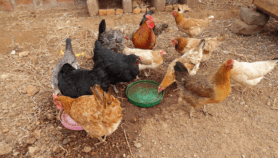By: Christina Scott
Send to a friend
The details you provide on this page will not be used to send unsolicited email, and will not be sold to a 3rd party. See privacy policy.
Improved nutrition cannot substitute medication to treat people infected with HIV or tuberculosis, says a report released today (22 August) by the Academy of Science of South Africa.
A panel of 15 researchers, funded by the United States National Academy of Sciences, spent 16 months examining local and international medical research on nutrition, HIV and tuberculosis.
”No food, no component made from food and no food supplement has been identified in any credible study as an effective alternative to appropriate medication,” said Barry Mendelow of South Africa’s National Health Laboratory Services, who chaired the study.
In South Africa, traditional healers claim to have herbal cures for HIV, while some salesmen have been encouraging HIV patients to stop taking antiretroviral drugs in favour of vitamins.
And the South African health ministry has supported the use of beetroot, lemons and garlic to treat HIV. Researchers and HIV/AIDS activists have also accused the ministry of being reluctant to provide antiretroviral drugs.
”We need a well-nourished nation,” said Dan Ncayiyana, editor of the South African Medical Journal. ”But a well-fed population on its own is not going to resist HIV/AIDS without antiretroviral drugs.”
The panel noted that better nutrition can postpone when an HIV-positive person has to start taking antiretroviral drugs, and called for more research into how nutrition, HIV and tuberculosis interrelate in the developing world.
The panel also said there was a "startling" lack of locally-relevant, well-designed research on the best kind of diet for people with HIV or tuberculosis — particularly distressing given the wide range of malnutrition and micronutrient deficiencies present in South Africa.
Malnutrition and poverty remain a contributing factor in many infections, including HIV/AIDS and tuberculosis, said Esté Vorster, director of the Africa Unit for Transdisciplinary Health Research at South Africa’s North-West University, and also a member of the panel.
South Africa’s ministries of science and technology and health received the report last week (14 August).
Health Ministry spokesperson Sibani Mngadi told radio station SAFM (22 August) that the study confirmed the correctness of the Health Department’s focus on nutrition.
Nhanhla Nyiade, spokesperson for the Department of Science and Technology, told SciDev.Net that future briefings will be carried out to incorporate the recommendations into policymaking.













